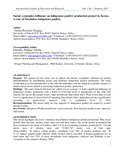The impact of land relations on the level of welfare of rural residents of Ukraine
The article discusses on the basic concepts of land relations. The analysis of the dynamics of the level of rent for the use of the land (a share), and is defined by its share in the structure of household income in rural areas is carried out. Conclusions on the welfare of the rural population are done. For the regions of Ukraine, which is not significantly different industrial and production potential, but have favourable natural resource factors for socio-economic rise, the use of land resources is an extremely important part of the development of economic complex.






